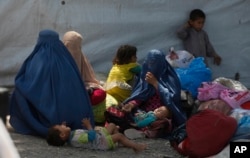Afghanistan hosted a new round of ongoing wide-ranging discussions with Pakistan Sunday in an effort to build mutual confidence and work together to bring an end to the Afghan conflict.
The Kabul meeting took place under a framework agreement of bilateral engagement called the Afghanistan-Pakistan Action-Plan-for-Peace-and-Solidarity (APAPPS). The process seeks enhanced military cooperation intelligence sharing to jointly fight regional terrorism and promote Afghan peace and reconciliation efforts.
Deputy Foreign Minister Hekmat Khalil Karzai, who headed the Afghan delegation, informed Sunday's meeting that the sides have made progress in the months-old dialogue process.
"The aim is to build trust to improve relations between Afghanistan and Pakistan, in particular, and Pakistan's cooperation in dealing with the ongoing war in Afghanistan," Karzai explained.
Head of the Pakistani delegation, Foreign Secretary Tehmina Janjua, while addressing Sunday's meeting in the Afghan capital, also praised the progress the two sides have achieved toward moving the bilateral relationship forward .
"It is a clear demonstration of how much we can do when we work together. We also bring the message of a commitment to peace and reconciliation in Afghanistan," she noted.
"We are now looking at what are the similarities and complementarities that we have between our two countries. We see that Pakistan and Afghanistan will grow together, inshallah [God willing], economically and in the context of peace and stability within the region," Janjua vowed.
The U.S-backed Afghan government has long alleged leaders of the Taliban insurgency are directing the war from their sanctuaries on Pakistani soil. Both Afghan and U.S. officials have been calling for Islamabad to expel, arrest or force Taliban leaders to the table for peace talks with Kabul.
Pakistan denies insurgents are using its territory for attacks inside Afghanistan, saying Pakistani forces through sustained operations have dismantled "all terrorism-related infrastructure" in near the Afghan border and have put in place enhanced border security measures to prevent infiltration in either direction.
"Pakistan looks forward to peace in Afghanistan. Pakistan has been doing its bit in this regard with other stakeholders," army spokesman Major-General Asif Ghafoor told VOA on Friday.
Foreign Secretary Januja reiterated at Sunday's talks in Kabul her country's strong support for Afghan President Ashraf Ghani's initiatives to encourage peace and reconciliation talks with the Taliban.
The Pakistani diplomat said Ghani's overture followed by his unilateral temporary Eid cease-fire with the Taliban "gives great hope for everyone" seeking an end to the Afghan conflict.
Ghani's cease-fire prompted the Taliban to declare its own cessation of hostilities during the three-day Eid festival. But the insurgents ignored calls for extending their cease-fire and have since returned to the battlefield with more intensity.
Pakistani officials say their influence with the Taliban has receded in recent years but they have pledged to use "whatever leverage" Islamabad has to assist in kick-starting Afghan peace talks.
Afghan ambassador to Pakistan, Omar Zakhilwal, acknowledged earlier this month that Islamabad played a role in the temporary Taliban cease-fire but he would not share further details.
Speaking in Washington on Thursday, the commander of the U.S. Central Command (CENTCOM), General Joseph Votel also noted recent bilateral engagements have improved military cooperation between Pakistan and Afghanistan.
"And that has increased the level of interaction between the military. And what we've seen is, we've seen a corresponding decrease in confrontations and conflict and tensions and exchanges along the border. These are very positive things," Votel told reporters in Washington.
Kabul and Islamabad under the comprehensive APAPPS dialogue are also discussing ways to encourage an "honorable and voluntary" repatriation of nearly three million Afghans still residing in Pakistan.
Pakistani authorities have been pushing for an early repatriation of all Afghans, saying it will depress remnants of Taliban insurgents from using the refugee population as a hideout.






